Mired in mayhem
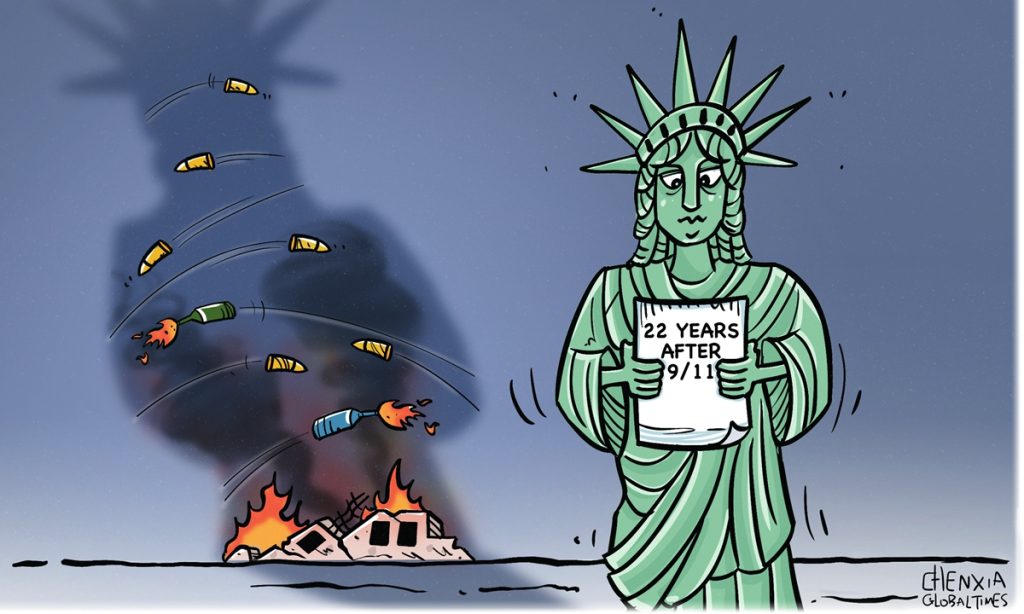

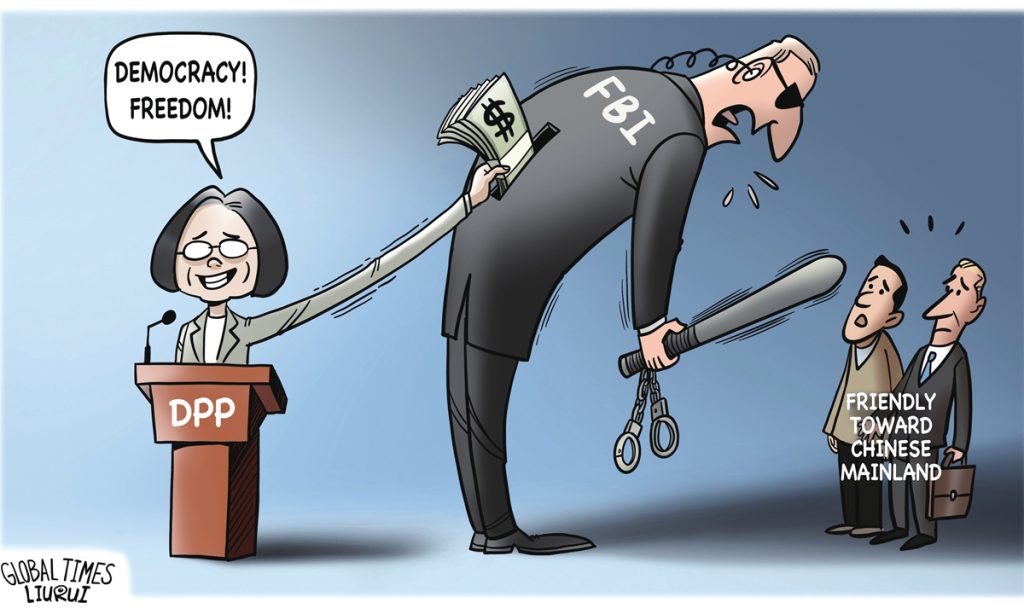

Thousands of workers on three key auto assembly lines went on strike after the United Auto Workers (UAW) failed to meet the deadline to agree with Detroit's Big Three automakers Thursday night. The union warned that the strike could escalate if the two sides could not yet reach an agreement.
The UAW has 150,000 members at the three companies. The three Detroit-based companies, General Motors, Stellanis Automotive (formerly Chrysler) and Ford Motor Co, have been losing market share due to stiff competition from Japanese, South Korean, European and Chinese automakers, but they remain pivotal in the US job market.
Meanwhile, the Washington Post reported on Friday that TikTok and the US government are rekindling negotiations, after ban threats for six months. NPR, on the other hand, repeated its earlier judgment that the Biden administration demands that TikTok be sold, or risk a nationwide ban.
Both of these seemingly unrelated events are, in fact, related to the policy of the Re-industrialization of America. And the key lies in the marketplace.
The strikes by car company workers are about the future competition of American-made cars with Chinese, Japanese and European cars in the global marketplace. And the demand for a forced takeover against TikTok shows how far Washington has gone to prevent Chinese companies from taking over the US market.
The timing of the strike is crucial, coming at a rapid change in the global auto industry and on the eve of the highly anticipated 2024 US elections.
From Obama's "Forward" (2012) to Trump's "Make America Great Again" to Biden's "Battle for the Soul of the Nation," there has always been one thread: the push to re-industrialize America. However, workers' wallets, bosses' profits, markets and the "soul of America" don't always go hand in hand.
In the case of the auto industry, the key is the ability to produce cars at competitive prices with a bigger market share. Clearly, this strike signals a move in the opposite direction.
The strike highlights a trend that has been evolving for nearly two or three decades: de-industrialization. It is reminiscent of the work stoppage between August 1986 and January 1987, which involved 22,000 employees of USX, the leading steel manufacturer in the US. It was the longest-lasting work stoppage in the history of the US steel industry and signaled the beginning of the industry's downward spiral.
The decline of the US steel industry is primarily due to fierce cost competition brought about by globalization.
While it is too early to predict a similar fate for the US auto industry, rising labor costs will certainly undermine the competitiveness of US car companies.
Relying on further policy subsidies may keep market share in the short term, but in the long run, it will only make US auto companies even less proactive and innovative.
In fact, until the Trump era, the US government has continued to give subsidies and other incentives to the steel industry, failing to save it from its decline.
The audacity of the US auto unions to ask for high prices also reflects the acute labor shortages and rising inflation. This, in turn, intensifies workers' demands for an income increase, and the price of cars has started to spiral.
Washington's protectionist trade policies and the containment of Chinese manufacturing may ensure US market dominance in some industrial sectors for some time. However, it's important to note that it's not just at the high end of the scale, like chips, but more importantly in consumer sectors like online shopping, electric cars and mobile phones, where the expanding of Chinese manufacturing can't be stopped.
TikTok is a case in point. TikTok has generated intense market aggressiveness in the consumer sector, turning people's passions into profits. ByteDance, which owns TikTok, generated a net profit of $3 billion in 2022. Washington is keen to prevent such lucrative profits from flowing into foreign coffers.
This complex interplay of industrial strategies and global market dynamics will continue to shape the future of American industry and its global influence.
The challenge for the American empire is primarily to maintain its dominance in almost all sectors of industry and their markets. It is this attempt at global market hegemony that will ultimately cause the empire to falter.

US Commerce Secretary Gina Raimondo said she was "upset" when China's Huawei Technologies released a new phone with an advanced chip during her visit to the country last month but noted that the US has no evidence China can make these components "at scale," Bloomberg reported. She also said the US is trying to use every single tool at its disposal to deny the Chinese the ability to advance their technology in ways that can hurt the US.
Raimondo's words are nothing new, but saying that China's technological advancement "can hurt the US" is a stupid and ridiculous line of thinking. Many American elites refuse to accept that the Chinese have broken through the technological blockade. Radical lawmakers are calling for efforts to strangle Huawei and SMIC, which is not only hegemonic but also an evil way of thinking.
Whether it is ASML, the Dutch manufacturer of lithography machines, or the American chip giants, they do not believe that decoupling can stop China's progress in semiconductor technology. They believe that China can find alternative methods and its own technological path. However, a large number of American elites are non-technical and refuse to face reality, blindly believing that Huawei's breakthrough is because the US export controls on technology to China are "still too loose."
It should be said that Huawei's breakthrough has to a certain extent undermined the credibility of the US' technological blockade against China and shattered the collective confidence of the West in this regard. Washington's current investigation into the origin of Huawei's chips and attempts to tighten the noose on the blockade against China will only isolate itself.
Because Washington clearly lost the first round, it has to bet even bigger and risk losing the Chinese market for many Western semiconductor companies. Imagine the result of continuing technological restrictions if Huawei makes further breakthroughs - can ASML's lithography machines still enjoy their current glory? Where will the US-controlled chip production factories find their next market? Just look at the panic faced by Japanese and German automotive giants today in the face of the rise of Chinese electric vehicles. If the current semiconductor leaders are cut off from the Chinese market, who can guarantee that their future situation will be better?
Huawei's Kirin 9000s is a breakthrough that it was forced to make by the US sanctions. If the US exerts even greater pressure, it will turn this breakthrough into a systemic breach, promoting a highly integrated and strong production chain in the Chinese semiconductor industry. Chips produced in China will also be much cheaper than those produced in the US.
If the US semiconductor industry loses the Chinese market, it will not be as lucky as Google and Facebook. The latter have software advantages that some Chinese internet companies do not have, including the application ecosystem they established by being the first movers. However, semiconductors are hardware, and when Chinese companies like Huawei can provide a cheaper alternative, the situation will be completely different.
A crucial crossroads has been reached. If the US forces China to achieve complete independence in the semiconductor industry, it will have no further cards to play in blocking China's progress. Moreover, the technological landscape of the world will undergo a rewrite. China now possesses the capital, and we will continue to progress no matter what. It is now the US' turn to make a choice: continue gambling or change course and resume cooperation?
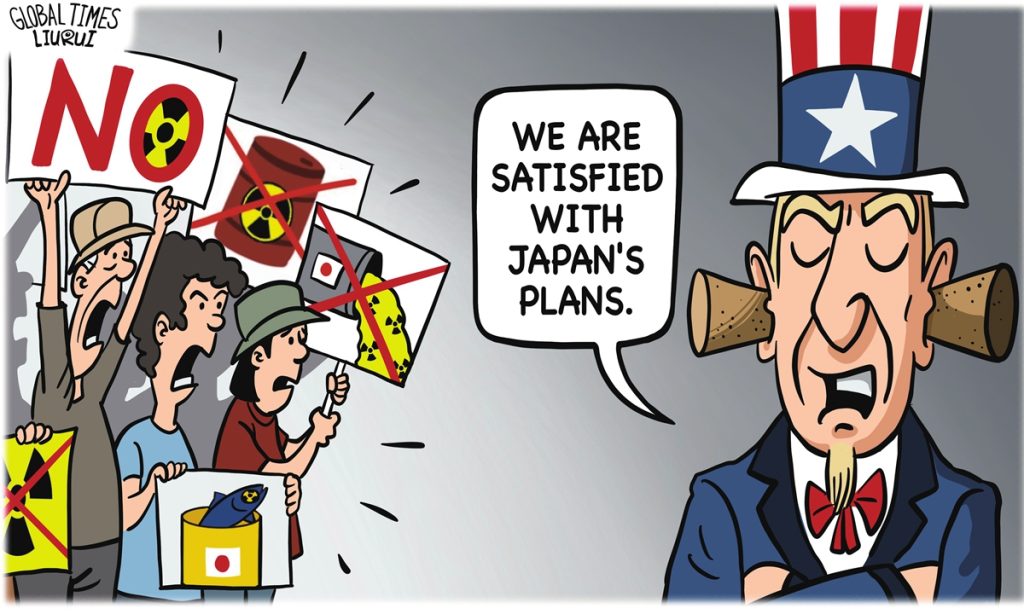
In late September at the Human Rights Council, government representatives and NGOs denounced Japan's discharge of nuclear-contaminated water into the sea at an interactive dialogue with the Special Rapporteur on hazardous substances and wastes, who mentioned "the inadequacy of existing standards and the long-term impact of low-level radiation and the organically bound tritium in the food chain." A few days later, Prime Minister Manasseh Sogavare of the Solomon Islands, speaking at the United Nations General Assembly, slammed Japan's discharge move as "an attack on global trust and solidarity."
China has been vocal against Japan's decision to dump nuclear-contaminated water into the sea, and has been repeatedly calling on Japan to address the concerns of the global community, and to dispose responsibly in line with its international treaty obligations.
Western countries and their media outlets, the purported champions of the environment and human rights, have chosen to look the other way. One month since Japan unilaterally started the release of nuclear-contaminated water, the Western media narrative on Japan's discharge plans and actions has certainly raised eyebrows.
Blatant double standards
Just imagine how the Western media would react if a similar plan was adopted by China, an easy target for whatever it does.
On environmental protection, in the words of The New York Times, "Every time someone in China eats a piece of meat, a little puff of smoke goes up in the Amazon." It blamed China for a large part of the climate crisis. Similar articles usually appear in tandem as if carefully arranged.
The fact is that China's carbon emission per unit of GDP in 2020 dropped by 48.4 percent compared to 2005. In other words, China has overfulfilled its promise of lowering its carbon intensity by 40 to 45 percent ahead of the 2020 target. And China's energy consumption per unit of GDP decreased by 28.7 percent from 2011 to 2020, making it one of the fastest movers in reducing energy intensity.
It is totally wrong and absurd to blame China, a country that has made significant contributions to environmental protection, but to turn a blind eye to the risk of Japan's discharge plan.
Some Western media outlets have selectively filtered out the plan's negative impact, and repeatedly cited the conclusion of the IAEA's comprehensive assessment report, trying to justify Japan's action and downplay the risk of the plan.
However, these important facts, among others, have been missing in Western reports:
- the so-called assessment was not authorized by the IAEA Board of Governors and has not been fully discussed by member states;
- compared with independent third-party testing, Japan's own water testing has been incomplete and unrepresentative;
- the wastewater contains not only tritium, but also other hazardous radioactive materials that are yet to be fully disclosed;
- a long-term monitoring mechanism has not been established;
- Japan has failed to fulfill its international obligations under the UNCLOS and the London Convention.
Diverting public attention
Some Western media commentators, including The New York Times, have sought to deflect the blame on China, hinting that the pollution caused by the wastewater from China's nuclear power plant poses a more serious challenge.
Here are some basic facts. The wastewater from the normal operation of a nuclear power plant is different from nuclear-contaminated water in sources, types of radionuclides, treatment complexities, and monitoring mechanisms.
Labeling, one of the common tactics of Western media, is also employed to whitewash Japan's discharge plan. The Economist labeled China's moves as a "Chinese Communist Party disinformation campaign," and those expressing anger and disappointment on the internet as "nationalist netizens."
Through biased reports and misleading labels, the Western media have given a false impression and portrayed China, one of the many victims of the plan, as an aggressive, hypocritical and hysteric neighbor.
In the face of this blatant double standard and hypocrisy set by the Western media, the world should be vigilant and remember that the so-called moral high ground of the West cannot be relied upon.
The way the Japanese government treats the nuclear-contaminated water has set a bad precedent while also opening Pandora's Box. Its discharge plan, in essence, is a significant nuclear safety issue with cross-border and long-lasting implications. More than 60 radionuclides contained in the contaminated water that will be discharged continuously into the sea for 30 years or more will not only damage the marine ecological environment but also endanger human health and life.
As Prime Minister Manasseh Sogavare noted, "If we are to rebuild trust and reignite global solidarity, we must be honest and frank in protecting our oceans which is the lifeblood of our people." Japan should explore other options for addressing the treated nuclear-contaminated water, instead of simply dumping it into the ocean.

The hypocrisy of the US is on full display in its newly-released report on China, while Washington’s anxiety on its own capability to dominate public opinion is also bubbling. The report, launched by the US Department of State on Thursday local time, is called “How The People’s Republic Of China Seeks To Reshape The Global Information Environment.” And the first reaction of the most readers is – isn’t the report about the US itself?
The report focuses on accusing China of information manipulation via propaganda, disinformation, and censorship in an attempt to seek information dominance globally. Yet it sounds more like a portrayal of Uncle Sam himself when he is looking at the mirror, and then makes it about China, Shen Yi, a professor at Fudan University, told the Global Times.
Has China ever manipulated global information like the US has been doing? Like the time when Washington claimed there were weapons of mass destruction in Iraq, the media parroted the claim, and US allies followed suit in US-led invasion of the Middle East country? Or like the time when the US faced the world's highest COVID death toll, the US took the top spot on Bloomberg's COVID Resilience Ranking?
If the US claims No. 2 in the world in disinformation and public opinion manipulation campaign, no one dares to claim No. 1. Think about how US political elites and media outlets uniformly bleats the word “unprovoked” in reference to Russia-Ukraine conflict, despite the fact that the conflict was not only provoked, but deliberately provoked by NATO’s eastward expansion; and how the US distracts public attention from US investigative journalist Seymour Hersh’s report that the US was the mastermind behind the Nord Stream pipelines explosion, by claiming the sabotage was made by a six-member team of a pro-Ukraine group.
The US takes every measure to make the world hostile against Washington’s rivals. Launching an information war against China is therefore a part of US containment strategy, with a goal to create an “evil” image of China in the international public opinion arena. The new report is simply a latest example in US long list of tactics to make the world vigilant toward China.
This is why the US has been encircling China, half a world away from US own soil, with a chain of military bases and ports, yet calling China an “aggressor.” When a Chinese civilian unmanned airship accidentally floated over the US, the later made no hesitation in labelling the incident an act of espionage. The hysteria lasted for months until Pentagon, after a lengthy examination, confirmed it did not collect any information, not to mention send any data back to China.
American elites are so comfortable living in their echo chamber to repeat their accusation on “forced labor in Xinjiang,” which appears in almost every China-related report issued by US authorities. Unsurprisingly, it also shows up in the latest report. When people, especially from Western countries, have actually visited Xinjiang, acknowledge the development, improved healthcare, rising education and employment levels in the region, as what they see with their bare eyes, the politicians in Washington are busying clamoring so-called genocide and forced labor.
But whenever someone tells the truth, or whenever Chinese media tell the truth, they are labelled as a puppet of a Chinese propaganda machine. Who is manipulating information? How come the US has the freedom to spread disinformation but China becomes a manipulator for telling the truth?
The US State Department gets one thing wrong. It is not China manipulating information. But the US has been undermining its own credibility by lying for so long. It seems the US can also sense the fragility of its manipulation. Unfortunately, the way it responds to it is spreading more disinformation by smearing its rivals.
The more the US tries, the more its hypocrisy is exposed. The last thing the US cares about is public access to information, it cares about its hegemony, including that in the information field. Otherwise, why Julian Assange and Edward Snowden have to go through prosecution just for telling the truth?
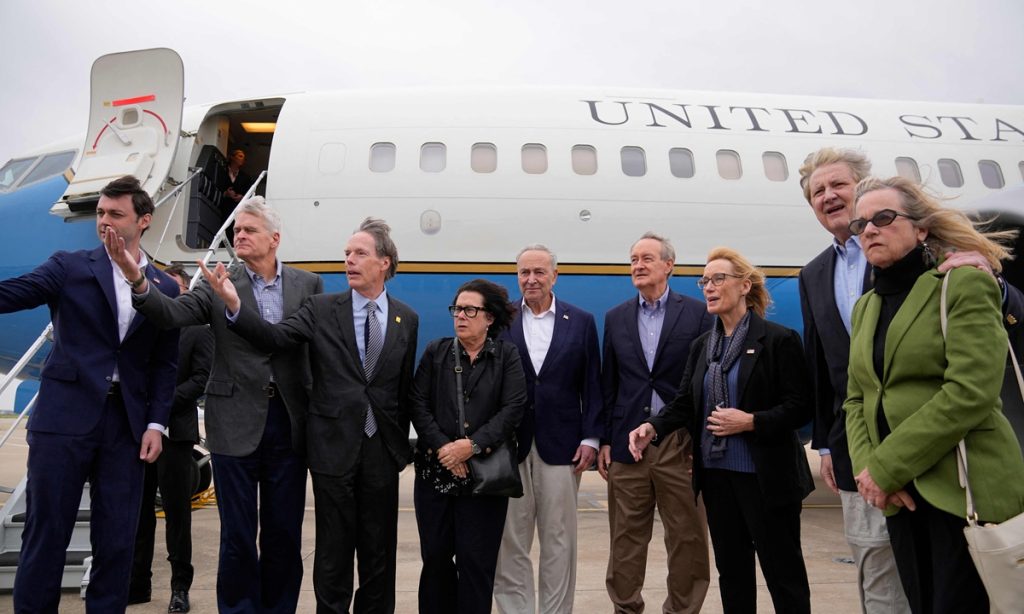
A US bipartisan congressional delegation led by Majority Leader Chuck Schumer arrived in Shanghai and began visiting China on Saturday. Schumer, when meeting with Chen Jining, secretary of the Shanghai Municipal Committee of the Communist Party of China, said the US did not seek conflict and wanted to achieve a level playing field, "as we compete economically."
Since June of this year, several senior US officials and lawmakers have visited China in succession, and the two sides have formed new working groups to solve the economic conflicts that have occurred in recent years.
It seems that the China-US relations are progressing in rebuilding a new track in an organized manner.
On Wednesday, China's Foreign Ministry said, "We hope this visit will contribute to a more objective understanding of China in the US Congress, increase dialogue and communication between the legislatures of our two countries, and add positive factors to the growth of China-US relations."
We do not expect this single trip to change the US legislators' view of China, which is formed based on their fundamentally different ideologies that see China as a challenger from the East.
Given the downward spiral of US-China relations in recent years, any official interaction and communication would benefit both sides' understanding of the other, and direct contact, in particular, can have an unintended impact.
When these legislators see China's political and economic realities, mainly what has changed and what has not changed in China after the three-year epidemic, they will learn what the Chinese people are thinking and doing and how they see the US. Even if it is a brief visit, it will have some impact on them when they propose policies on China in Congress.
We hope these legislators will have a comparative mindset when looking around and talking with Chinese people.
When they compare what they see and hear in China with the reality in the US political arena, especially regarding political stability, they might gain a deeper understanding of the philosophy of national governance.
The conflicts and frictions between China and the US are closely linked to the domestic politics of both nations, which continue to shape the direction of the relationship.
Domestic politics in the US, especially the "war" on Capitol Hill, the struggle to reach the debt ceiling, the removal of the Speaker of the House and the news of former President Donald Trump's resurgence, have created confusion and eroded international trust in the stability of US politics.
The polarization of the two parties and both parties' internal politics, as well as the activism of anti-establishment and far-right forces in Congress will add to the uncertainty for the fragile reconstruction of China-US relations and the mutual trust.
Before his trip, Schumer, who leads the group of lawmakers, once again emphasized the ideological differences between the US and China.
China has never shied away from this difference. But ideological differences do not mean the US can arrogantly lecture China.
When a mainstream perception of China as a significant challenger has been formed in the US Congress, legislators will consider the China factor when proposing bills on a range of domestic and foreign policies.
As more US lawmakers visit China, they will gradually realize that the hegemonic anti-China atmosphere they have on Capitol Hill when discussing China policies is nothing more than a self-created illusion. They are no longer qualified to lecture China.
They can make their demands, but at the same time they need to listen to the Chinese side. And it is dialogue on an equal footing that is conducive to the stable coexistence of the two great powers.
The US Congress can significantly influence the White House's China policy. China will naturally take note of the atmosphere of Capitol Hill regarding China. However, it will not be perturbed by them. China's role in shaping the future of US-China relations is increasingly significant.
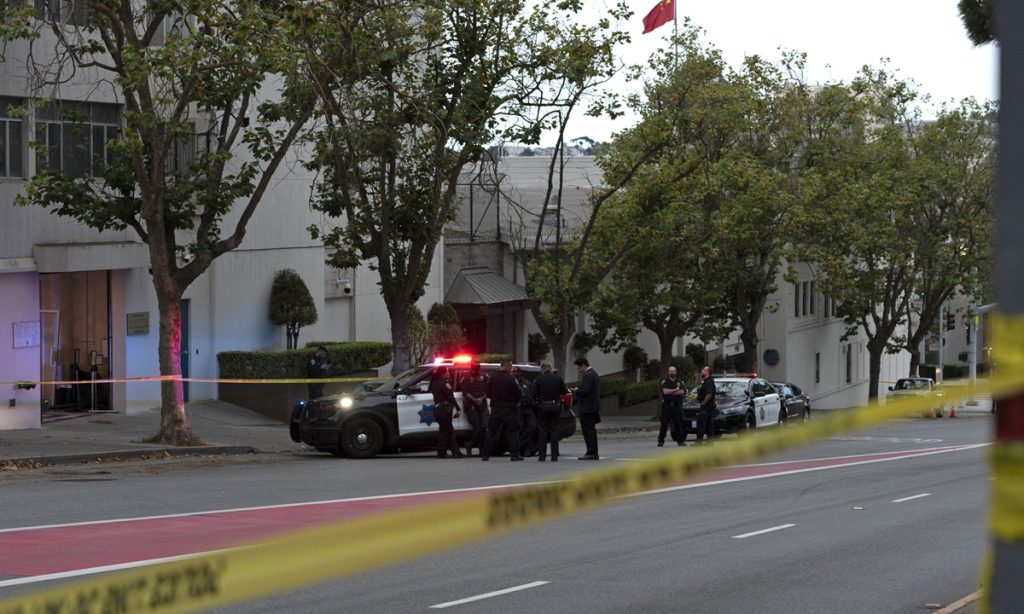
The incident that a man drove into the lobby of the Chinese consulate in San Francisco on Monday is very disturbing. The driver was shot by local police and later died at the hospital.
During a press conference held by the San Francisco police after the incident, it was not disclosed whether the intruder was carrying any weapons. No information regarding the identity of the driver or the motive behind this act has been provided by the police.
The Chinese Consulate-General in San Francisco is located a few blocks away from the "Six Sisters" building, a landmark in the city. The fact that the lobby of the consulate was accessible from the street allowed the driver to breach security, but fortunately, all consulate personnel are reported to be safe.
In a statement, the Chinese Consulate-General in San Francisco severely condemned this incident, demanding that the truth be quickly ascertained and dealt with seriously in accordance with the law. Currently, the focus is on identifying the driver and determining whether this was an isolated incident or if there is a broader context.
The Chinese Consulate-General in San Francisco has faced multiple incidents in the past. On New Year's Day in 2014, the main entrance of the consulate was attacked with gasoline, and in March 2008, the consulate's main gate was set on fire using flammable liquid. After each of these incidents, the US government promised to enhance security for Chinese consulates, but subsequent events suggest that these promises have not been adequately upheld. It is evident that the situation in US society is chaotic, and it places Chinese consulate staff in a perilous situation akin to "diplomats in a war zone." The failure of the local police to prevent such incidents undoubtedly becomes a stain on US diplomacy.

Buoyed by the prospect that China's economic growth is set to rebound at a faster pace in the fourth quarter this year, the country's equities market rallied on Friday, with the benchmark Shanghai composite index gaining more than 1.55 percent.
During the past several months, a wave of negative Western media reports targeting the Chinese economy swirled and surged, intentionally creating a false narrative in order to cast a cloud over China's investment outlook.
Some pundits in the US media went too far claiming that China is facing "an economic stagnation that seems irreversible" - typical Western rhetoric that tries to talk down China's growth and frighten away investors.
The Western media have tried to paint China's economy as facing the same predicament as the implosion of the US economy in late 2008 and early 2009, or suffering from the same throes of Japan's "Lost Decades" beginning 1990 when Japan's real estate and stock market bubbles suddenly melted. But as it has been proved many times before that while Western commentary predicting the collapse of Chinese economy keeps surfacing, in the end it is the Western rhetoric, not China's economy that will fail drastically.
As a matter of fact, overseas concerns are largely played up and inflated by US-led Western media outlets, such as the Wall Street Journal and the New York Times. Their allegations that China's future is now "blanketed with public anxiety and widespread pessimism" are simply untrue. It's of a media disinformation campaign built on fake journalism.
The Covid-19 pandemic has scarred the world's all major economies because of its severity. China's relatively uneven recovery is no parallel with the Lehman-style subprime fiasco caused financial crisis in the US, nor resembling the debt-driven boom and bust cycle of Japan, as some in the West have always hoped.
Since 2017, the bulging bubbles in China's housing market have largely dissipated thanks to the policymakers' visionary and pre-emptive moves to restrict bank and social lending to developers, and at the same time the country's central bank has trimmed interest rates to channel funds to back up high-end manufacturing, high-tech innovation, infrastructure build-up and public welfare enhancement, which strengthens China's foundation for future competition among the nations.
Chinese policymakers understand that a dormant real estate market caused by the pandemic is never a healthy phenomenon and represents a drag on the economy. On August 31, the People's Bank of China, the country's central bank, and the National Administration of Financial Regulation jointly issued a series of easing measures for the property sector, which includes lowering minimum down payment ratio and mortgage rates, easing criteria for first-home buyers and interest rate cuts for existing first-home mortgage loans.
It is very wise for the central government to readjust its headline housing policies by rescinding some of the strictest measures that have inhibited property sales in major Chinese cities. Many provincial capital cities have removed policies limiting apartment purchases, which has led to a recent boom in housing sales nationwide.
And, China's credit market is expanding again, with the latest central bank data showing the country's total social financing increasing by more than 3 trillion yuan ($413 billion) in August. The marked improvement in social liquidity was primarily driven by the government's recent growth-reinforcing policies, including an acceleration in government financing, which rose to 1.18 trillion yuan in August from 0.41 trillion yuan in July.
In addition to improvement in credit, economic data for the last few weeks have generally shown encouraging signs too, including the consumer price index turning positive again in August. And while the manufacturing purchasing managers' index improved to 49.7 in August with key components such as production and new orders being above 50, export and import growth have also improved.
As the government continues to pivot policy focus to supporting the private sector rejuvenation, welcoming foreign investors, and propelling the accelerated growth of domestic consumption and investment, more positive economic signs will emerge in the fourth quarter. And, government bond issuance accelerated in August too. Increased bonds sale should pave the way for the government to introduce more spending measures in the next few months to rev up economic growth.
The policymakers have recently moved to halve equities-trading stamp duty and cut equity transaction fees, controlling the pace of initial public offerings and encouraging dividends and buybacks while controlling insider sales, in order to give a shot to the capital market. The size and breadth of the announced measures have exceeded investor expectations. Rallying equities are going to firm up Chinese households' wallet, which will translate to higher consumption.
China's gross domestic product rose 5.5 percent in the first half year. The IMF has predicted that China's economy will expand by 5.2 percent this year, contributing one third of the global growth. It is very likely that the Western naysayers cursing China's economy will be forced to admit and walk back their overhyped rhetoric.
By all metrics, China's economy is not facing a crisis and the ship is not sinking, as alleged by the naysayers in the US and its allied countries. Relying on China's peculiar systemic merits and the policymakers' vision and firm determination to committing to high-level opening-up and win-win partnership with all friendly countries, and enhancing the national strength through constant investment on technological advances, Chinese economy's strong resilience, unrivalled vitality and ample growth potential will only grow.
In today's interconnected world where the destinies of countries are closely linked, the coexistence and mutual exchange of different civilizations are important drivers for advancing human civilization and promoting global peace.
The Golden Panda Initiative from artists of different ethnicities and languages was also released at the forum to make the world a better place. Embrace the mission of promoting a harmonious and mutually beneficial civilization in this era; collaboratively create artistic monuments that reflect shared values; act as friendly ambassadors of cultural exchange and mutual learning; continuously unleash the youthful energy of cultural heritage and innovation.